
Transcription
Emancipation Initiative:
Life Without Parole (LWOP) , An Unconstitutional Sentence
The Emancipation Initiative's goal is to amend state and national regulations for mandatory long-term, life and without parole (LWOP) prison sentences as well as to reestablish prisoner voting rights. Life without parole is inconsistent with principles of the United States Constitution, because prolongs the reverberating pulses of slavery present in the 13th Amendment, which reads, " Abolish slavery and involuntary servitude, except (keeping in mind the except means to exclude) forced labor as punishment for a crime." Those condemned to a sentence of LWOP will forever remain chattel property of the state. It was US Supreme Court Chief Justice Roger B. Taney who declared in his notorious 1857 Dred Scott opinion that " a slave could never be a federal citizen and will be an inferior subordinate being."
E.I. illustrates how life without parole is in direct conflict with out Constitution and why the sentence is not compatible with out 14th Amendment's equal protections of citizen's rights, guaranteed to all American citizens. There are many offenders convicted of similar crimes within different states, as well as intrastate, who do not receive similar consequences. This distinction becomes clear when comparing states like Alaska, which does not have LWOP sentences or the death penalty; to Georgia, a state that currently enforces the death penalty; and to our own sate of Massachusetts, which upon conviction of a select crime will impose indefinite servitude. The question that arises is, how much do citizens and government officials honor our Constitution? Article IV section 4 of our original Constitution has become nearly obsolete in its practical application. The article is supposed to guarantee to all citizens a republic form of government. a government by the people though there elected officials.
Perpetual incarceration is slavery in the sense that the offender remains chattel property of the state for the remainder of his natural life. This fact helps demystify the obscurity of the 9th Amendment. I imagine most people haven't a clue to what the 9th Amendment is, and that they likely couldn't care less, nor want to learn of its authority, if they're unable to determine its applicability to everyday life. But, for the sake of clarity: the amendment decrees that human beings should have certain rights that should not be limited- although these rights are not listed within our Constitution. What those rights are has been left an open question for the courts and legislature to determine.
Similarly- and equally compelling- is that LWOP is a direct assault to our 8th Amendment, which prohibits cruel and unusual punishment. The 8th Amendment is an interesting amendment and the only one, with the exception of the 9th Amendment, that is tentative. The 8th Amendment draws its authority from language stating that laws must be in accordance with evolving standards which mark progress of our maturing society and human decency. This means that as society matures and evolves, the laws that govern us must also mature and evolve- this evolutionary process usually only occurs though an inclusive democracy.
As Americans is a must that we understand the importance of our voting rights. This understanding can probably be delivered though some of the stories of our great grandparents, who we plagued by the many deprivations cause by divisive disenfranchising tools. Some of the mechanisms used were literacy test, grandfather clauses, pool taxes, all white primaries, and even felony records garnered though the stringent application of vagrancy laws. These tactics were born from dissatisfaction with Reconstruction policies, and were known as " Black Codes." These practices ominously parallel today's truth-in-sentencing, crack- versus- cocaine, mandatory minimums, and voter ID laws. As a nation, we still battle with regretful practices. We are constantly reminded of the oppressive policies derived from Plessy's separate- but-equal doctrine, which remained active for decades due to disfranchisement and exclusion. Historically, public officials did all they could to repress the Black vote in order to maintain the existing status quo. They were pretty much up-front about their intentions: for example. former U.S Senator Ben Tillman. He stated, " We have done our level best. We have scratched our heads to find out how we could eliminate every last one of them. We stuffed ballot boxes(,) we shot them, (and) we are not ashamed of it." Tillman's ideal of an exclusively- tailored democracy still exist in the legislative intent of our criminal justice polices and , although the words of politicians today may not be as explicitly articulated, the policies and actions of our government officials yield the same results. Equally important, this history illustrates the sustained effort waged from various angels throughout the history of this country to exclude selected groups of people from voting though surreptitious methods, whether concerning African Americans, women , poor persons , or those who were not property owners. These tools of disenfranchisement and total exclusion are still in effect today in 2016-2017.
It was not until noble men like associate justice Hugo L. Black, a Franklin Delano Roosevelt appointee as well as former Klu Klux Klan member, and U.S Supreme Court Justice Earl Warren, an Eisenhower appointee who previously participated in the exclusionary relocation of Japanese Americans, gained influence that these laws and policies began to change. They worked in tandem to overturn segregation laws and to advance the progress of civil rights for the many people whose rights were not traditionally recognized. The actions of these noble men are all consistent with evolving standards of human decency. The fact Warren and Black facilitated these shifts in national policy is quite impressive, and ultimately illustrates the irony that Hugo L. Black, a man that likely participated in the joint venture lynchings of many human beings himself, took such a progressive position in his decision making as a U.S. Supreme Court Justice. His radical shift in respecting the rights of Blacks only serves to highlight that human beings are not incorrigible and do have the ability to change- like the many men who have changed here in Massachusetts and throughout the country, but who continue to languish in Department of Correction (DoC) prison institutions serving life without parole sentences.
The strangest thing about LOWP prison sentences is the prior to 1972, when the U.S Supreme Court's Furman v. Georgia decision temporary moratorium on death penalty, however- despite low recidivism and an already established re-integrationist criminal justice system- caused prosecutors to deploy pervasive fear mongering tactics that convinced community residents that all lifers would someday get out wreak havoc on their neighborhoods. This venomous rhetoric provided states with an incentive to enact life without parole statutes. These statutes simultaneously satisfied the calls of prosecutors and the anti-death penalty advocates who had worked to abolish the death penalty. Eventually, the death penalty was reinstated by the Greg v. Georgia decision, after LWOP had become integrated into the legal system. So, now that we as a society have life without parole, with persons indefinitely enmeshed in webs of indefinite servitude, the question that must be asked is, who represents the prisoner? Or any person caught up in the United States criminal justice system?
The American prisoner is entirely excluded from the political process and is denied a say in the very policies by which he or she is affected. The idea is that if an individual had violated the laws, then why should that individual have a voice or play a role in creating legislation by the way of the vote? The fact of the mater is. despite the many variations among criminal offenders, they still remain citizens of this great nation. Citizenship is the common thread that transcends the divisions of race, class and religions. The average American citizens loves their county simply because they know that when they peak up, they will be herd and listened to, whether the issue is an urban planning crisis, or an inefficient education policy within the local school district. Citizens freely voice any concerns of societal interest to their local and state representatives and expect legislators to perform the duties of the people who put them in that position.
The essence of our democracy is the constant progress of our evolving standards of decency. As stated, what point does the citizen disconnect from out government? Well there are many ways in which citizens temporarily become disconnected and excluded from our government. But there is also a totally disenfranchised demographic of 159,520 persons living in American prisons as actual slaves 1.035 right here in Massachusetts, ratified by the 13th and 14th amendments of out Constitution. These individuals are permanently excluded from the political process. A professor of law UCLA, Sharon Dolovich, described life without parole as " the perfect exclusionary strategy." She further added that, " in one stroke, the target is permanently exiled, foreclosed from ever making a case for release." Life without parole declares an American citizen incorrigible- but are human beings incorrigible beyond reform? U.S Supreme Court Justice Hugo L. Black wasn't- which is why ANY mandatory long- term, life , or life without parole prison sentence, absent any process for review, must be reconsidered and amended to provide offenders with a meaningful opportunity for parole eligibility, consistent with or constitutional rights as American citizens.
Article 1 of the United States Constitution prescribes a representative structure of government. Some time ago, an Athenian commander by the name Pericles said, " Our Constitution is called democracy, because power is not in the hands of the minority, but of the whole people." Unfortunately, throughout the history of our United States, this has not been the case for us. Remember the basis of our " American Experiment," in which the rallying cry for revolution began with a man simply inquiring, " Is life so dear, or peace so sweet, as to be purchased at the price of chains and slavery? (I) forbid it, Almighty God! " He continued, stating, " I know not what course others may take, but for me, GIVE ME LIBERTY OR GIVE ME DEATH!" This is common from a man ho owned slaves himself, but nonetheless equated disenfranchisement to slavery and refused to live under conditions that in any way transposed those same conditions upon himself. His name was Patrick Henry, and he was one of our nations earliest patriots and believers in freedom and independence. The casual factors which led up to such visceral remarks stemmed from the ripened seeds of disenfranchisement. These seeds eventually matured into rich harvest of tyranny and oppression. As made evident, disenfranchisement and exclusion has been evil we've been grappling with in this country for centuries. But regardless of the age and times, disenfranchisement amounts to oppression which we can all understand an relate to. We understand it because in some form or way, and at some point in time, the menacing face of oppression has revealed itself to each and every one of us.
Given the current status of our democracy, I.I.'s focus is to engage local communities: they have the biggest stake in the outcome of our planning events. Tis is why these events will be tailored to the needs and issues of out local communities. Our passion at these events is primarily to listen and provide support to participants and not dictate solutions or preconceived outcomes based on our own agendas or perspectives. We look forward to establishing relationships with all participants, so we can develop transparent strategies and clear agendas that will encourage inclusion among local residents and participation of community members. Our criminal justice system is far reaching and affects a wide array of American citizens- this is why our goal is not to get as much participation as possible in events, but to know: who is not participating, and why not? We hope to create an inclusive atmosphere among residents that will provide people a platform to freely voice their opinions as well as provided suggestions on how we can go about creating the change that the people all want to see and be a part of.
Throughout these processes, E.I. will work to educate communities on why our attempt to end LWOP prison sentences is relevant. By participating and building on the knowledge and information about the sentence, we hope to infuse a sense of clarity related to why we must abolish the sentence. Participatory development is a learning process for everyone, including myself ( the author) and the facilitators and volunteers. In order for our agendas to succeed, all participants must be willing to learn, change their attitudes, and forge new ways of understanding. These events are vehicles for us to evaluate and take part in legislative problem-solving and engage in democratic decision-making. They help us achieve our collective goals of an inclusive democracy and an absolute Emancipation for all peoples.
In conclusion, a brief quote from Abraham Lincoln's November 19, 1863, Gettysburg Address is appropriate, in which he stated " It is for us, the living, rather to be dedicated here to the unfinished work when they have this far so nobly advanced... dedicated to the great task remaining before us... That this nation...shall have a new birth of freedom- and that(this) government of people, (and) by the people... shall not parish from the earth." Thank you everyone for your time and attention and LONG LIVE THE PRINCIPLES OF OUR DEMORACY!
Derrick Washington
emancipationiniative@gmail.com
Facebook @emancipation.intitative
Submitted By:
Timothy J. Muise
Steering Committe Member
Emancipation Initiative
Timothy J. Muise, #W66927
MIC Norfolk
PO Box 43
Norfolk, MA
02056-0043
Other posts by this author
|
2017 jun 24

|
2017 jun 24
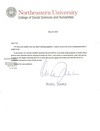
|
2017 jun 24
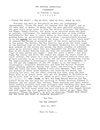
|
2017 jun 24
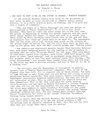
|
2017 jun 18
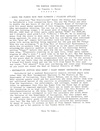
|
2017 jun 15
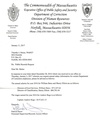
|
More... |
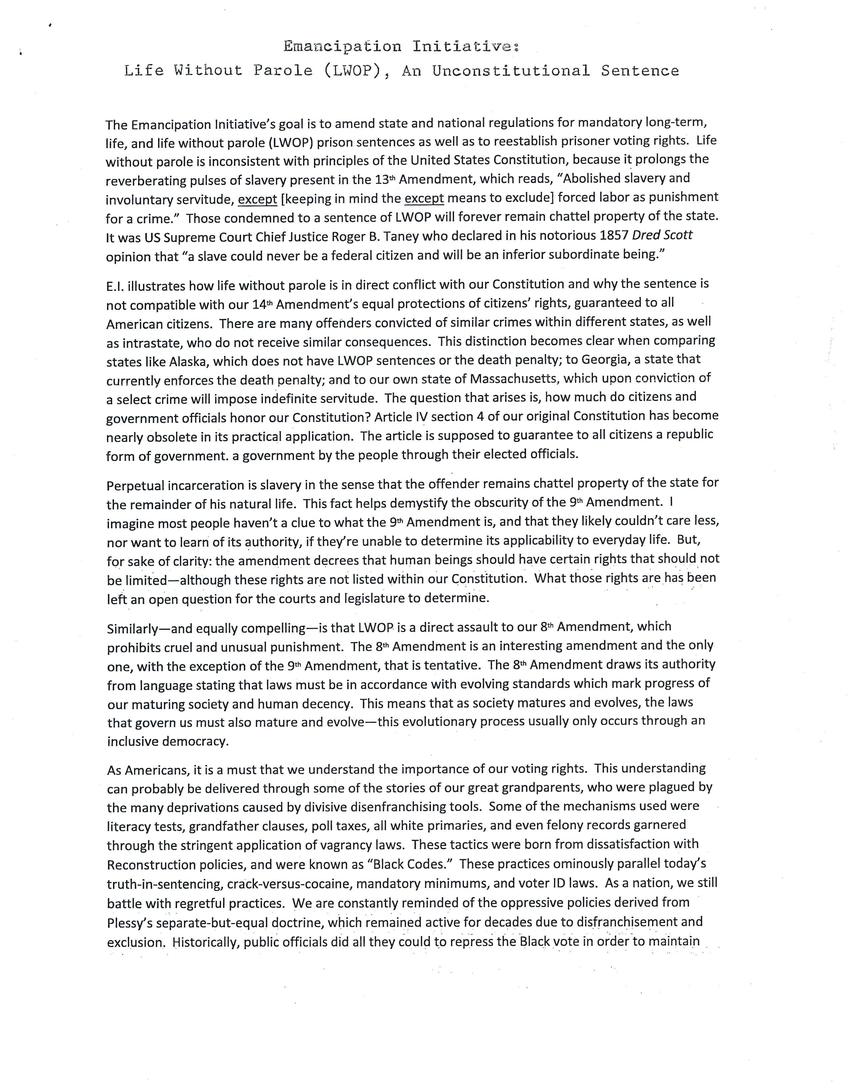
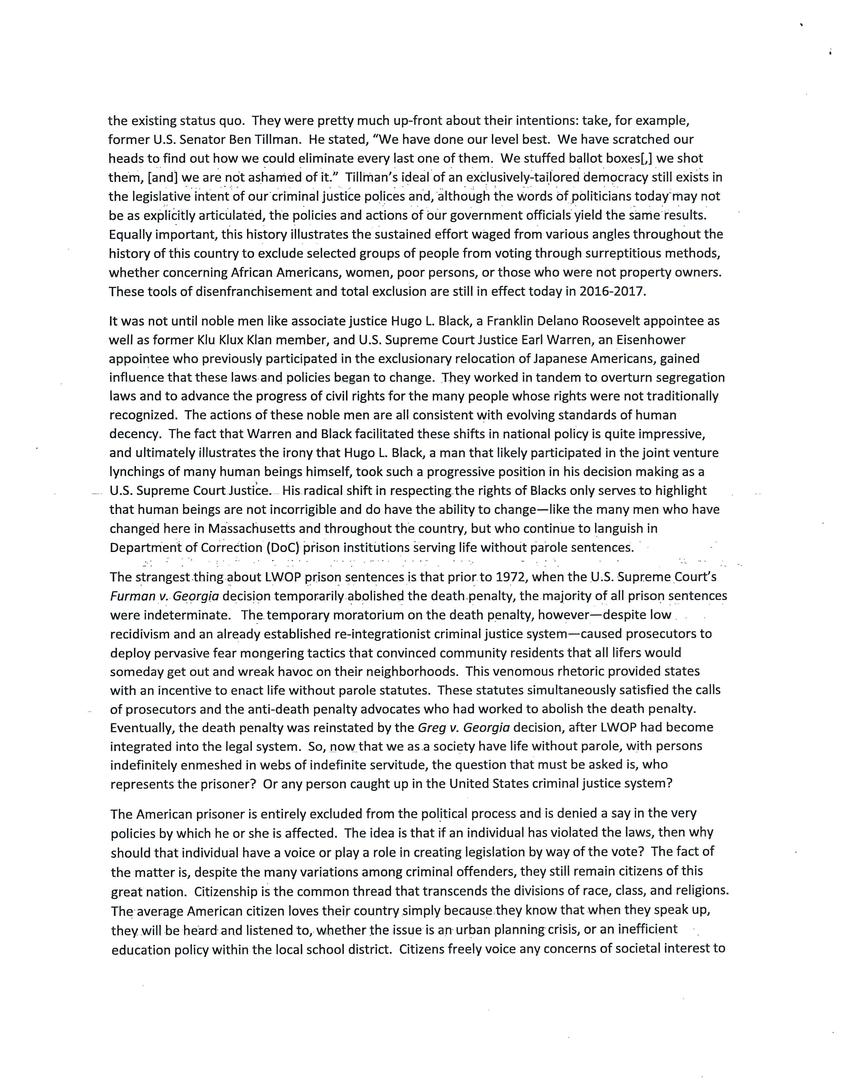
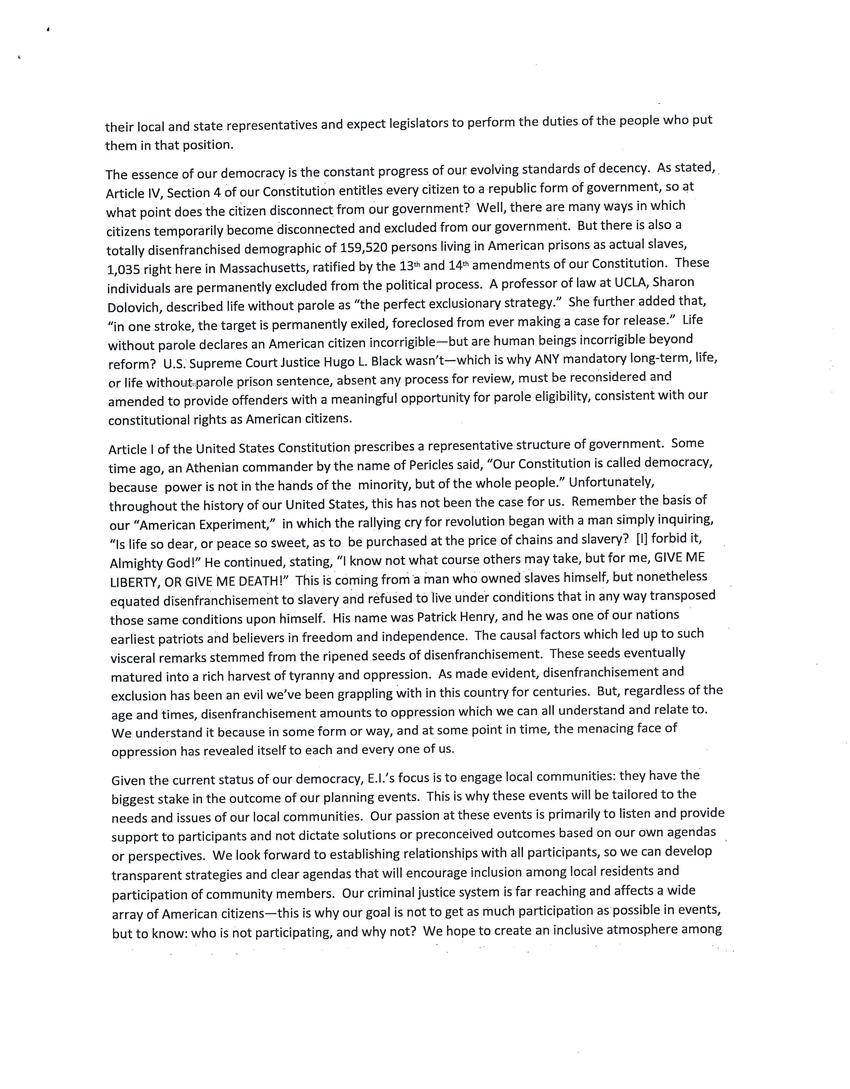
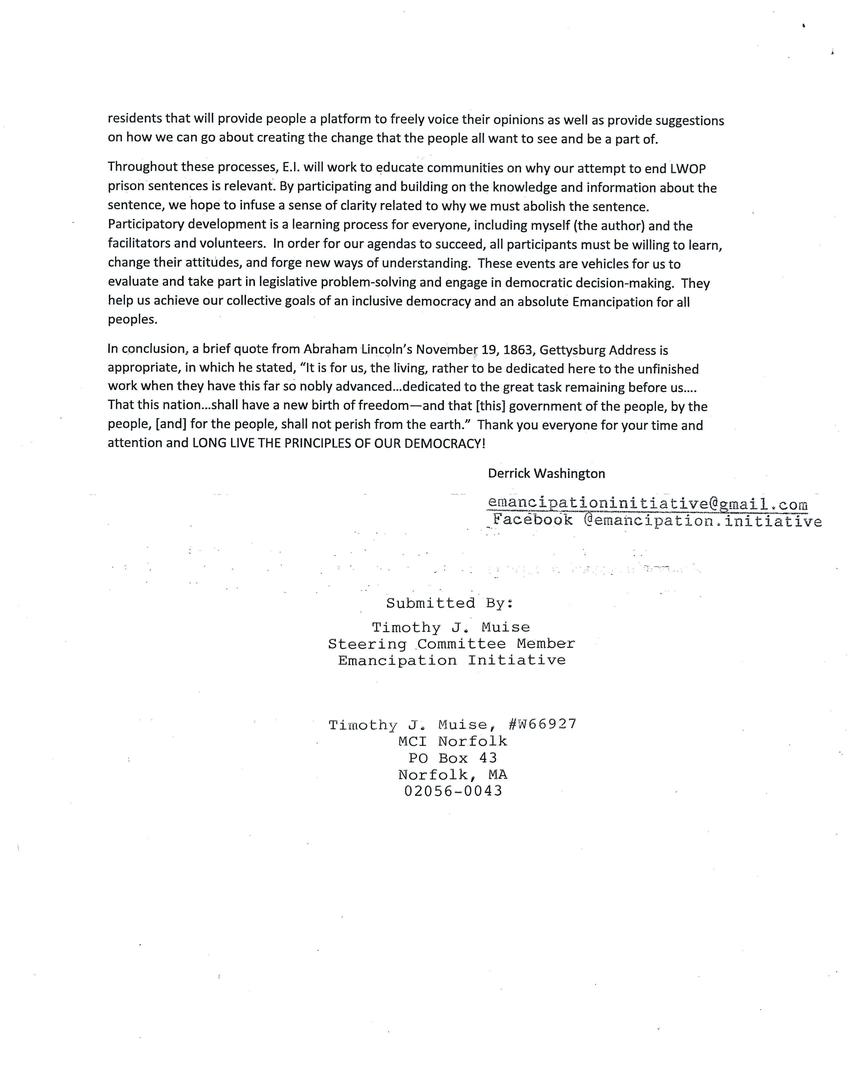

Replies (3)
" Thiscould be u someday. Is this how you want to experience it?"